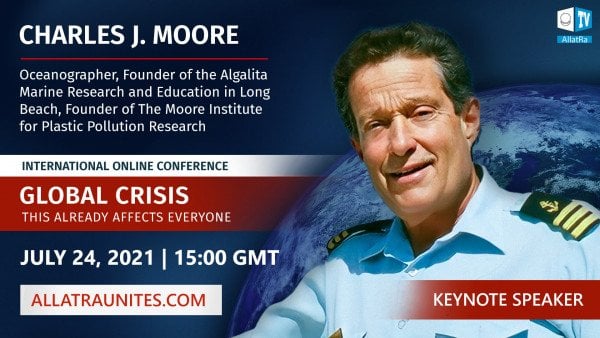Charles J. Moore
Oceanographer, Founder of the Algalita Marine Research and Education in Long Beach, Founder of The Moore Institute for Plastic Pollution Research
Speaker Bio
Charles J. Moore is an oceanographer and boat captain known for articles that brought attention to the 'Great Pacific Garbage Patch'.
Moore is the founder of the Algalita Marine Research and Education Foundation in Long Beach, California. In 2008 the Foundation co-sponsored the JUNK Raft project, to "creatively raise awareness about plastic debris and pollution in the ocean".
The Foundation sponsored an expedition to the Southern Hemisphere that involved Moore and his colleagues traveling to Easter Island to collect water samples for analysis of plastic content.
In May 2020, Charles J. Moore founded The Moore Institute for Plastic Pollution Research and serves as Research Director.
Co-author of a book written with Cassandra Phillips "Plastic Ocean: How a Sea Captain's Chance Discovery Launched a Determined Quest to Save the Oceans" (2012).

Speech
I'm very pleased to be part of an international conference, of a crisis-oriented conference that truly does affect everyone - it’s what my belief is regarding plastic pollution.
So my name is Captain Charles Moore. I'm the founder of Algalita Marine Research and Education. I'm the founder of the Moore Institute for Plastic Pollution Research. And I'm also the founder of Long Beach Organic, which is a local community gardening program.
What happened in 1997, when I crossed, what is currently known as the Great Pacific Garbage Patch, was simply an observation of a seagoing captain standing watch, that after just a few minutes, something would pass by that didn't belong there, something of human origin, a floating piece of plastic.
The idea that in the middle of nowhere, as far from human civilization as you can get anywhere on Earth, the detritus, the refuse of human civilization was there in an alarming quantity.
This was 1999 when I returned and with some sampling equipment. And that's really when the discovery was made. The other the 1997 discovery was simply a feeling of unease about seeing debris out in the middle of the ocean.
But in 1999 that was truly the discovery, because in 1999, after we analyzed our samples, we realized that there was six times as much plastic in the surface waters by weight as zooplankton, the basic food of the ecosystem.
We decided that because there was no focus on plastic pollution, we would take the lead in beginning to create what came to be known as “The Great Plastics Awakening”.
And the basic problem is that plastic, unlike other substances, doesn't go away.
It remains in the environment. It doesn't go through the normal biodegradation cycle. It was invented to defeat natural decay.
So in defeating natural decay, it made itself a permanent part of our environment.
Now, we know that these microplastics become nano plastics. They get to become airborne, they get into our water and they get into our food and even our vegetables.
So not only was our initial findings that, you know, it was a big problem for marine creatures, now it's a problem for everything, everybody, every habitat, you name it.
The ocean suffers from the same problem that I had when I was trying to make people aware of plastic. And that is, that no one lives in the ocean. Everyone lives on the land.
So for most people, who live on the land, the ocean is just a stranger. It's just a strange, different place and really doesn't, as far as they can see, as far as they know, doesn't have an effect on their daily life. I mean, yes, there are hurricanes. Yes, there are storms. Yes, there are floods along the coastal zone. But in general, a person living on the land doesn't regard the ocean as a big part of their lives.
Dr. Sylvia Earle makes the concise statement, “No Blue, No Green!”, you know. We really need the ocean in so many different ways and its importance can't be underestimated.
We call a nicely functioning human body, a body in homeostasis, a body that's well balanced. It has all systems working in harmony together. We can't have a planet in homeostasis without the ocean environment and the land environment working in harmony together.
They have to be balanced. Right now, the civilization we have is peaking and has thrown that balance as far out of kilter as it has ever been in the history of the world. Our civilization has peaked and it's peaked at a point where it can't go any further down the road, it's on an infinite growth. It has to retract and has to retrace. It has to have a pullback into circularity, into reconstruction, into zero waste, into reuse, into recycling.
We're failing miserably in suppressing climate change and plastic pollution. So there's no good outcome in the future for our civilization based on the current trends.
We need to think about the future. We need to have the concepts that can break through the now, which is so repressive, so awful, just so miserable.
It's just hell on Earth. It's a Dante's inferno - out in the ocean, in many places - it's just different layers of hell. That is happening to the creatures in the ocean. You can just see it on many of the beaches that are just inundated with this plastic.
So, we must go beyond our contentment with this baseline that you're experiencing and be discontented and live a life of critical thought, of criticism, and of long-term thinking in order to be able to have any kind of a future worth having, worth living in.